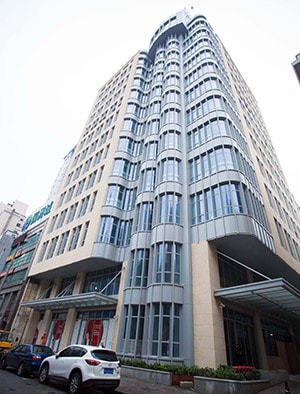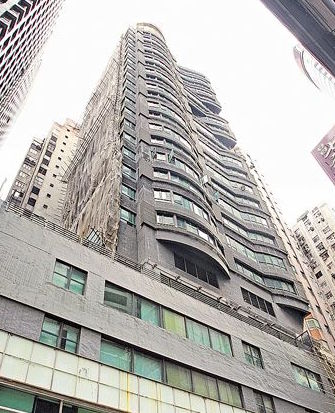
Ivan Ho, CEO for Hong Kong at Kailong
Warburg Pincus-backed Kailong has purchased eight properties in Hong Kong over the last year, and now the real estate fund manager is taking a few pages from WeWork’s success story as it plans to redevelop this HK$3.7 billion ($471 million) in assets into boutique office space.
While the Hong Kong-based firm still falls short of WeWork’s $20 billion valuation, it is targetting quick returns for the investors who backed this string of acquisitions by selling off individual units in the projects in Wan Chai, Sheung Wan and Tsim Sha Tsui on a strata-title basis, Ivan Ho, CEO for Kailong’s Hong Kong arm, told Mingtiandi during an interview.
“We now see the evolution [of office demand] is that people do not need an office spanning a few floors. Fast-growing companies with few and mobile employees need just a small space in greater CBD locations,” Ho said. While the company’s principal aim is to market space in their buildings on a strata-title basis, Ho added that Kailong is also open to en-bloc sales if the right opportunity arises.
The firm’s strategy of selling office space in small footprint buildings targets companies whose employees have to travel frequently, as well as local manufacturers who may operate factories in the New Territories, but also want an office near the central business district. “We are obviously not targeting WeWork’s tenants — those twenty-somethings with no principal capital and rely on seed funding for their business operation. We target frequent travellers who already have well-established businesses but lack a space,” said Ho.
The company is considering bestowing a unique brand on the chain of boutique offices in Hong Kong and may also extend the strategy to future properties that they will acquire in mainland China.
Offices With Clubhouses

In 2015 Kailong bought a hotel on Shanghai’s Yunnan Lu and converted it to office
While Kailong’s boutique office buildings are targetting a customer base distinct from the typical co-working tenant, the new projects borrow one of the key elements of flexible office strategies to increase the value of the office space — a high percentage of common areas for events, recreation and networking.
According to Ho, Kailong will allocate around five to ten percent of the space in their new office properties for communal use, where the owners can meet their clients or just relax. “They would need a good network of decent places for meetings in the greater CBD providing good services, facilities and related technology.”
To enhance the value of these common areas, Kailong intends to engage co-working operators to manage the clubhouse portion of the projects. Ho says that Kailong, which previously redeveloped and leased a whole building in Shanghai to WeWork, is currently in talks with flexible office and club operators to let them take charge of common areas in the boutique office chain.
The fund manager shrugs off the idea of leasing the entire building to flexible office operators as they did in the case of a hotel that they redeveloped on Shanghai’s Yunnan Lu two years ago and then leased to WeWork. “We might get roughly 2 percent rental yield [doing multi-let]. Co-working operators might offer a bit higher rent with profit sharing but yield would still be unattractive. Property owners would actually take higher risk [leasing to co-working operators] as it might cost us a potential buyer who wants to purchase the en-bloc property at a higher price,” Ho said.
Instead, Kailong is interested in engaging international co-working brands which do not yet have a foothold in the city centre to operate the common spaces in its projects. The fund manager sees this strategy of engaging with co-working operators to manage the projects as a way for it to enhance the branding of the boutique offices by leveraging the space provider’s membership network.
Boutique Offices to Tap Strata-Title Space Demand
Among the potential clients for Kailong’s boutique offices could be companies from north of the SAR border, as mainland companies have been among the most aggressive acquirers of strata-title assets in Hong Kong over the past year, often setting new record prices.
In September last year, investor Shi Jinyu, identified as a mainland property developer by local media, bought the 79th floor of The Center in Central for HK$55,854 per square foot, breaking the price record for office space at that time.
The deal was followed by the sale of the 33rd floor of Far East Finance Centre in Admiralty to a mainland company two months later. The buyer paid HK$50,000 per square foot — the second-highest price then for office floors — for the property.
To capture the growing demand in individually owned commercial floor, brokerage firm CBRE recently set up a speciality group focussed on strata-title sale in April.
Kailong Stockpiled Assets Close to Central

Kailong plans to convert this hotel on Wan Chai’s Jaffe Road into offices
Among the recently acquired properties that Kailong is hoping to funnel into this strata office demand are five buildings in Sheung Wan — one MTR station west of Central — which it spent a total of HK$1.4 billion on last year, according to local media reports. A building at 56-58 Wing Lok Street near the Western Market has already been demolished and is ready for construction.
East of Central in Wan Chai, Kailong purchased a property at 333-335 Hennessy Road in May last year and followed up with an acquisition at 297-305 Jaffe Road in November, spending a combined HK$1.65 billion on the two assets.
In April, Kailong reportedly bought 90 percent ownership in a residential block on Cameron Road across the Victoria Harbour in Tsim Sha Tsui for HK$650 million, with this Kowloon proeprty also slated to become office space, according to Ho.
While the redevelopment progress among the properties differ, Kailong expects to see at least some of its projects completed as early as next year.
New USD Fund on the Way
More redevelopment projects adopting the same strategy will come as the company is raising a new, US dollar-denominated fund to invest in properties in Greater China, with a target size of $500 million.
The fund will focus on commercial and industrial properties in Shanghai and Beijing, according to Ho, as well as venturing for the first time into the Greater Bay area cities of Shenzhen and Guangzhou.
The private equity firm currently employs over 60 people at its offices in Beijing, Chengdu, Shanghai and Hong Kong, and has invested over $2.8 billion in 48 assets since its establishment in 2004. After already exiting 28 of its investments, Kailong has a track record of five yuan-denominated funds totalling RMB 2.8 billion since 2010, along with its US dollar vehicles including a pair of Outbound Investment funds, and two Hong Kong dollar funds.
Leave a Reply